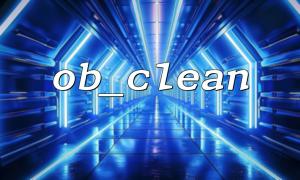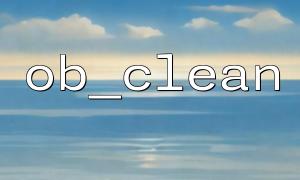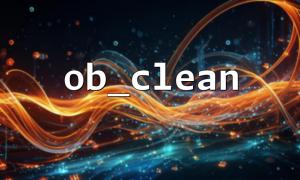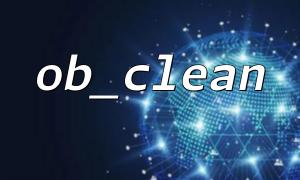In PHP programming, ob_clean() is a widely used function for managing the output buffer. Its purpose is to clear the current output buffer without sending the buffered content. Many developers face the problem where the cache doesn’t clear after using ob_clean(), which can be puzzling—why does the buffer still hold content even though this function was called?
In this article, we will dive deep into how ob_clean() works, analyze common misconceptions that cause the cache to remain uncleared, and provide practical solutions.
In PHP, the output buffering mechanism allows output data (such as HTML, text, or error messages) to be temporarily stored in a memory buffer instead of being sent directly to the browser. The advantage of this mechanism is that you can modify output during script execution or control when the output is sent to the browser under certain conditions.
The ob_clean() function clears the contents of the current buffer. When called, the contents of the buffer are discarded without outputting any data.
ob_start(); // Start output buffering
echo "Hello, world!";
ob_clean(); // Clear the buffer
// Nothing is output here because the buffer was cleared
It’s important to note that ob_clean() only clears the currently active output buffer. If there is no active buffer or no data is buffered at the time of calling, the function will have no effect.
Although ob_clean() is clearly defined in documentation, developers frequently encounter the following misconceptions that lead them to believe the cache was not cleared:
If ob_start() is not called first to initiate output buffering, calling ob_clean() will have no effect. In PHP, ob_clean() can only clear the buffer after output buffering has been started.
// Incorrect example: output buffering not started
ob_clean(); // No effect here because there is no buffer
The correct approach is:
ob_start(); // Start the buffer
echo "Hello, world!";
ob_clean(); // Now the buffer will be cleared
PHP supports nested output buffers. If ob_clean() is called without properly handling the nested buffer structure, it may clear the wrong buffer instead of the one you expect. PHP’s output buffers work like a stack, so you may need to use ob_end_clean() to end and clear the topmost buffer.
ob_start(); // Start first buffer
echo "First output";
ob_start(); // Start second buffer
echo "Second output";
<p>ob_clean(); // Only clears the second buffer, not the first<br>
// You need to call ob_end_clean() to clear the outermost buffer<br>
If the output buffer has already been sent to the browser, ob_clean() cannot clear the content that has been delivered. PHP automatically sends the buffer contents to the browser once they are ready or when output is triggered. This usually happens after calling flush() or when the script ends.
ob_start();
echo "Hello, world!";
flush(); // Send buffer contents to browser
ob_clean(); // ob_clean() is ineffective now because content is already sent
The solution is to avoid prematurely sending the buffer content or to use ob_end_clean() to end the output buffer directly instead of trying to clear it after content has been sent.
If you provide a callback function when calling ob_start() to process the buffer contents, ob_clean() clears the processed content after the callback. If the callback function has bugs or logical errors, it might appear as though the buffer was not cleared.
function custom_callback($buffer) {
return strtoupper($buffer); // Converts buffer content to uppercase
}
<p>ob_start("custom_callback");<br>
echo "Hello, world!";<br>
ob_clean(); // Clears the buffer, but content might have been altered by the callback<br>
PHP has many other caching mechanisms (such as OPCache, database query caching, etc.) that are unrelated to output buffering. Therefore, ob_clean() only clears PHP’s output buffer and does not affect other types of caches.
To avoid the above misconceptions, developers should follow these best practices:
Ensure output buffering is properly started: Always call ob_start() before ob_clean().
Understand the buffer stack structure: When using nested buffers, make sure you clear the correct one, or use ob_end_clean() to clear the topmost buffer.
Avoid premature output: Don’t send buffer contents before calling ob_clean() or ob_end_clean(), and avoid calling flush() too early.
Check custom callback functions: If you use custom output buffer handlers, ensure their logic is correct and doesn’t interfere with clearing the buffer.
By understanding these details, you can manage PHP output buffering more effectively and prevent issues where the cache appears uncleared.







